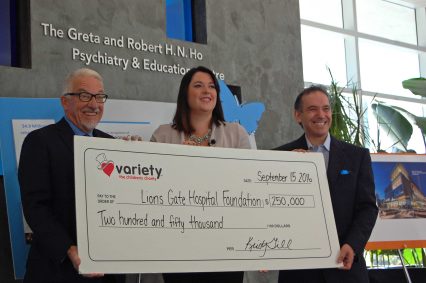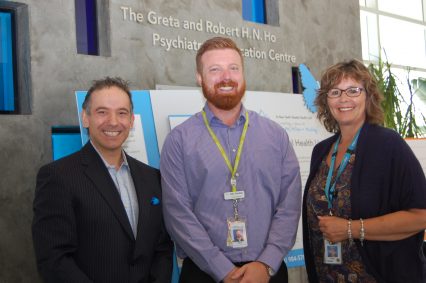Carlile Youth Concurrent Disorders Centre welcomes Dr. Jordan Cohen
Dr. Jordan Cohen’s passion for his work is evident the moment he starts to speak. And, he has a lot to say about the new Carlile Youth Concurrent Disorders Centre opening in the HOpe Centre next spring. As the Medical Manager of the CYCDC and North Shore Child and Youth Mental Health and Substance Use Services, Dr. Cohen is excited about the opportunity created with this much-needed facility serving youth between the ages of 13 – 18 who have exhausted options in the community and are in need of an acute care setting where they can be assessed, stabilized and supported on a path to recovery.
“Our job is to support these individuals develop into the young adults they are meant to be,” Dr. Cohen explains. “This is very rewarding work. It can also be very challenging and requires a collaborative, multidisciplinary approach. I’m looking forward to helping build a strong team here at the Carlile Centre.”
Dr. Cohen, a graduate of the Psychiatry Residency Program at the University of Calgary has extensive experience working with youth. He was the Medical Director of the Young Adult Inpatient Program at Foothills Medical Centre in Calgary; the Medical Director of the Northwest Family Adolescent and Child Services Outpatient Clinic in the Department of Psychiatry at the University of Calgary and the Postgraduate Psychiatry Residency Program Director in Calgary, among many other responsibilities. After more than a decade in Alberta, he is excited about his new role in British Columbia.
Building a Collaborative, Multidisciplinary Team
“The Carlile Centre is one of only two facilities in Canada serving youth with concurrent disorders,” he explains. “This unit will contribute to our national understanding and knowledge of concurrent disorders and will help to forge new best practice. I’m looking forward to being part of a collaborative team where we will learn from each other and from our patients.”
Dr. Cohen emphasizes that the collaborative team includes community service providers. The Carlile Centre is a regional program, serving the entire VCH region. Patients will be admitted to the inpatient unit, for an average of 21 days, when community-based treatments are no longer working for them. They need to be motivated to get better and prepared for abstaining from substance use. During their inpatient stay, youth will be assessed, stabilized and prepared for the next stage of treatment in the community.
Working with Community Partners
“I’m really impressed with the work underway to develop referral pathways into the Carlile Centre,” Dr. Cohen said. “This unit is not the only, or even the best option for every patient. We need to be sure their needs are met, if not here, then in the community. The supports and relationships these young patients have in the community are key to their long term outcomes. That is why the Carlile Centre staff will work closely with the community teams before, during and after the patient’s hospital stay. Telehealth will play a key role in supporting this collaborative approach.”
With his wife Yvette and children, Joelle, age 8 and Jude, age 5, Dr. Cohen is happy to be settled on the North Shore, and is looking forward to getting to know his new “work family” at Vancouver Coastal Health.
Contract Awarded, Construction Commences
With PAX Construction announced as the General Contractor for the new Carlile Youth Concurrent Disorders Centre, work is now underway to complete this unique inpatient unit by April 2017. The design of the ten-bed unit reflects input and expertise from many different stakeholders, including clinicians, youth, family, and facility planners.
“The facility is planned to create a client and family-centred environment,” explains Florrie Levine, Capital Project Planner, Lower Mainland Facilities Management. “The goal is to create a safe, comfortable, homelike environment.”

Lions Gate Hospital Foundation board chair Pierre Lebel (L) and Dr. Jordan Cohen (R) accept a $250,000 cheque from Kristy Gill of Variety – The Children’s Charity. Construction of the $5 million unit is being funded by the LGH Foundation.
Safe and supportive environment
Currently empty shell space, the third floor of the HOpe Centre was not originally designed for this inpatient unit. A creative approach was employed by Kirsten Reite Architecture to maximize access to natural light, especially for common areas in the centre of the unit. This requires modification to the north wall to provide larger windows and north views. All patient rooms have windows, as do the counselling rooms, kitchen/dining area, family meeting rooms, indoor activity room and classroom. The central activity space and care station areas will be oriented to benefit from the windows in the kitchen/dining areas.
Creating the right environment to meet the needs of youth is complex, and the planning process included two engagement sessions where youth mental health clients provided input into the design process. Use of colour and graphic elements to create a safe, homelike environment and assist with wayfinding were flagged as priorities. An Environmental Graphics consultant, Signals Design Group, is engaged to guide this work, which will include further consultation with youth.
Key elements of Carlile Centre
All spaces are designed to enable assessment, stabilization, and treatment planning as well as client and staff safety. This includes:
- 10 inpatient rooms, each with a shared washroom
- Clinical spaces, including counselling offices, exam room, comfort room and seclusion room
- Support spaces, such as Care Team Base, reception desk, unit clerk workstation, offices, medication room, meeting rooms, supply rooms and other spaces
- Activity spaces, including patient lounge, kitchen & dining areas, family meeting rooms, multipurpose room, classroom and more
Creating a One-of-a-Kind Team
professional, passionate, … perfect!
VCH has initiated recruitment for nurses and allied health professionals as we begin to build the Carlile Team. Postings are up at http://careers.vch.ca/carlile-centre/
“This is a unique unit. We need people who can work well together,” explains Dale Handley, Clinical Planner for the Carlile Youth Concurrent Disorders Centre. “We are building a multidisciplinary team that is passionate about helping youth struggling with acute mental health and substance use challenges. This requires more than professional skills, we need people who are truly committed to working with high-risk youth on their journey to recovery.
The current focus is on recruiting allied health professionals who have worked as part of a youth outreach team, and nurses with experience or training in child and youth mental health and substance use. As a member of this multidisciplinary team for this new regional service, staff will be supported to continue developing their skills and to share this expertise as they work with clients, families and community-based service providers from across Vancouver Coastal Health.
For more information contact: Tanis Evans at Tanis.Evans@vch.ca or Dale Handley at Dale.Handley@vch.ca

The CYCDC team includes: Dr. Jordan Cohen, Medical Manager of the regional centre, Dale Handley, Clinical Planner, and Tanis Evans, Manager, Mental Health and Addictions.

